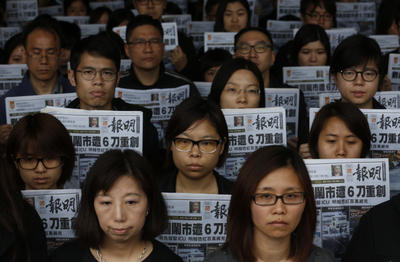Since the incident, a vague fear has begun to spread. Although self-censorship was increasingly common before the attack, journalists, critics, commentators and political activists did not believe that their physical safety was under threat. Yet the truth of the incident has not been revealed; and most people consider that even if the attacker is arrested, he will not expose the entire conspiracy.
Hong Kong is an international financial, business and services centre; the rule of law and freedom of information flow are its most important assets. The Chinese authorities and business tycoons understand this very well. If these two assets are being eroded, Hong Kong will hardly have an edge over Shanghai and other major coastal cities in China.
Still, there is very keen competition in Hong Kong’s media market, so the entire spectrum of political views can still be articulated as long as they have a following.
But one very powerful force to be reckoned with is the United Front organisation of the Chinese Communist Party, which attempts to build support for its policy programmes.
The United Front focussed on winning over the media and universities in the war for public opinion after the Tiananmen Incident. These efforts were stepped up following the massive protest rally against the proposed legislation to combat treason, secession, sedition and subversion against the central government according to Article 23 of the Basic Law on 1 July 2003.
In the past few years, the United Front’s influence over the media has become even more prominent — as confrontation continues over political reforms and the Hong Kong government’s popularity declines.
There has been pressure exerted on Radio Television Hong Kong ,the sacking of the popular presenter Lee Wai-ling — a staunch critic of the government — in Commercial Radio, and there has been a personnel reshuffle in Ming Pao. These events are broadly perceived as being related to the United Front’s recent campaign to curb opposition voices.
Before these threatening moves, the United Front had adopted a relatively effective carrot and stick policy. Media bodies that tend to toe the Beijing line are given preferential access to exclusive interviews and opportunities to produce special features on China. The revenue from the advertisements of major business groups and Chinese enterprises in Hong Kong also provide strong incentives. And media tycoons are often bestowed the honour of appointments to the National Committee of the Chinese People’s Political Consultative Conference.
Apple Daily, the newspaper most supportive of the pro-democracy movement, recently complained about the withdrawal of advertisements from local leading business groups. Also, journalists who are critical of Beijing often have difficulty getting work permits in China.
The recent weeks show strong hints that the Chinese authorities will insist on tightly controlling the list of candidates in Hong Kong’s Chief Executive election in 2017. If so, the electoral system to be announced will only lead to more protests and political confrontations. More important still, the Hong Kong Special Administrative Region Government will lose its claim to legitimacy — and it can hardly achieve effective governance.
More pressure on the media and pro-democracy groups is anticipated.
Chinese leaders apparently understand the political costs, but they seem to be willing to pay the price. President Xi Jinping has been engaged in power consolidation and economic reforms, while tolerance for political dissidence in Mainland China has been in decline. In this context, political reforms in Hong Kong thus face an uphill battle. The end result may well be a slow erosion of the territory’s social stability and international economic competitiveness.
Joseph Cheng is Professor of Political Science at the City University of Hong Kong.


Professor Joseph Cheng should have mentioned in his article that the 9 criminals who were involved in the attacked on the editor have already been apprehended. 2 were arrested with the help of the Chinese authorities. This is not an evidence based article. It is purely speculative without factual backing. Hong Kong media is a lot freerer than the mainstream Western media.
Professor Cheng is absolutely correct about what the mainland Chinese government is attempting to do, not only in HK but across all media worldwide. Criticism of China is met with bullying and intimidation as they attempt to control not only discourse within China, but also abroad. This is a well documented fact. China’s English language media, a weak attempt at ‘soft power’, is one hand clapping — the writers write, but readers don’t read. Chinese controlled media is relevant only because of its power. In optimizing the conditions for its survival, it has done away with even the slightest contender to its control. THere is nothing left but cynicism and irony to confront it. China’s state media retains significance because it has articulated a culture of intimidation and the public, having lived for decades under a rhetoric of menace, simply acquiesce — except for a very brave few. The discourse of the Chinese government stand by its power alone and by no means because of its virtue. Such governments will never feel secure till are no words left to express dissent.
Just to let you know that my new book: ‘Tiananmen Square “Massacre”? The Power of Words vs. Silent Evidence’ has been removed from Google Search yesterday (23 March 2014). This is an incident of western censorship. You can now search for my book only via the Amazon website. I have proven beyond reasonable doubt that the entire Western media industry knowingly lied about a Massacre in 1989 and continue to lie till this day. Human Rights Watch interviewed 15 eyewitness at that time and they all reported no massacre, but decided not to publish the report. Given the amount of agenda-based news manipulation across the mainstream media industry, how can developing countries such as China not censor such organized disinformation?